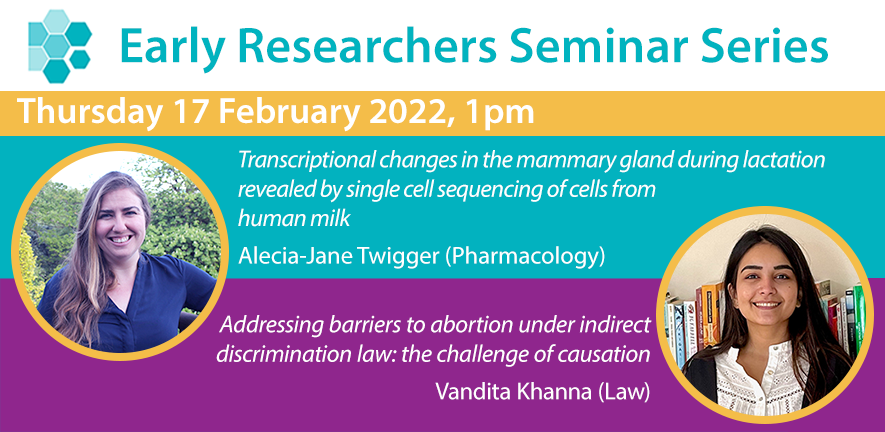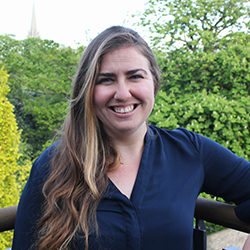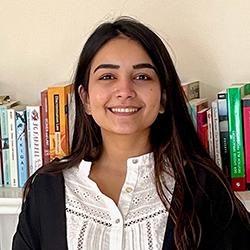
Thursday 17 February 2022, 1pm - 2pm
Transcriptional changes in the mammary gland during lactation revealed by single cell sequencing of cells from human milk
Alecia-Jane Twigger (Pharmacology)
Addressing barriers to abortion under indirect discrimination law: the challenge of causation
Vandita Khanna (Law)
Chair: Jinal Dadiya (Law)
Meeting link
The Zoom meeting details can be found on this page (Cam only; Raven login needed): https://www.repro.cam.ac.uk/erss-2021-22-zoom-meeting-details. If you don't have a Raven login, please email Christina Rozeik to receive the Zoom meeting link for this year's seminars.
Speakers and abstracts
Transcriptional changes in the mammary gland during lactation revealed by single cell sequencing of cells from human milk
Alecia-Jane Twigger (Pharmacology)
Findings from epidemiological studies suggest that breast cancer risk is influenced by parity in an age-dependent manner. However, human mammary tissue remodelling that takes place during pregnancy and lactation remain little understood due to the challenge of acquiring samples. Here, we present an approach to overcome this using both flow cytometry and single-cell RNA sequencing to examine viable primary mammary cells isolated from human milk compared to parous and nulliparous resting, non-lactating breast tissue. Thereby, we determined that separate to breast tissue, human milk largely contains alveolar luminal lineage cells, as well as immune cells. Our data reveal the presence of two distinct secretory luminal cell clusters in milk which highly express luminal progenitor signatures akin to non-lactating breast tissue luminal cells. Taking advantage of the fact that both the resting and lactating mammary gland contain a luminal compartment, we focussed on comparing these transcriptomes and identified differences in mammary cell function and metabolism between these maturation states. These findings provide the basis to dissect human luminal differentiation and milk biosynthesis pathways that in the future, may be interrogated to determine how parity influences luminal cell metabolism, milk production and breast cancer risk.
Alecia-Jane Twigger is a Research Associate at the Department of Pharmacology within the University of Cambridge. She began her career at the University of Western Australia, where she gained her PhD examining cells in human milk. Upon completion of her studies, she received a fellowship from the international society for research into human milk and lactation to enable her to cross the globe to work at the Helmholtz Centre in Munich. Here she was further accepted into the Helmholtz Postdoctoral Fellowship program, working in the human mammary cell research group led by Dr. Christina Scheel. At the end of 2019 she was invited to join Dr. Walid Khaled’s research group in Cambridge where she continues her work to better understand the mechanisms of breast maturation and human lactation.
Addressing barriers to abortion under indirect discrimination law: the challenge of causation
Vandita Khanna (Law)
The concept of indirect discrimination helps us see how laws that treat everyone equally may have a disparate impact on certain groups. Of late, the concept of indirect discrimination has been marshalled in academic discourse to trace how barriers to accessing abortion-related information and services, although facially neutral, have a disparate impact on women without good reason. And yet, the conceptual insight that links barriers to abortion with indirect sex discrimination remains far from absorbed in discrimination law. I seek to study what makes it particularly challenging to address abortion restrictions within the field of discrimination law. In my presentation, I analyse how the central question of causation in discrimination law continues to resist addressing barriers to abortion.
About Vandita Khanna: I am a PhD student at the Faculty of Law, University of Cambridge. My research interests lie in equality and non-discrimination law, human rights law, and critical legal theory. My thesis studies racialized poverty in UK equality and human rights law. I currently also serve as project manager for the Cambridge Pro bono Project and oversee research on sexual and reproductive health information under the European Convention on Human Rights. Prior to the PhD, I read for the MPhil in Law and BCL at the University of Oxford and completed the BA LLB (Hons) at Jindal Global Law School, India.
The Early Researchers Seminar Series (ERSS) is a platform for PhD Students and early career researchers (ECRs) at the University of Cambridge with research foci on reproduction to share and discuss their research with other academics from a range of disciplines also researching reproduction at the University. Seminars are held on Zoom on the third Thursday of every month, 1pm - 2pm. For more information, and for the full 2021 - 2022 programme, please see the main ERSS page.



